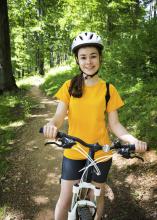Information Possibly Outdated
The information presented on this page was originally released on June 20, 2014. It may not be outdated, but please search our site for more current information. If you plan to quote or reference this information in a publication, please check with the Extension specialist or author before proceeding.
Keep kids safe while outdoors this summer
MISSISSIPPI STATE -- Warmer weather and no school mean local streets and sidewalks are filled with more walking and biking traffic, so drivers and parents must pay special attention to children’s safety.
“In the summer months, there are many additional precautions that parents need to focus on to reduce accidents,” said Louise Davis, Extension professor and director of the Mississippi Child Care Resource and Referral Network with Mississippi State University Extension Service.
In 2010, almost one-fifth of all children aged 5 to 9 who were killed in traffic accidents were pedestrians, according to statistics from the Mississippi Public Safety Data Lab.
Davis encouraged parents to be cautious around residential driveways and parking lots. Toddlers ages 1 and 2 lead statistics in the number of non-traffic injuries, according to the Mississippi Public Safety Data Lab.
“Everyone is eager to enjoy a family activity or vacation, but distraction can lead to accidents,” Davis said. “These children are small and cannot be seen by drivers. It’s important that parents stay alert.”
Another safety concern during summer months is the large number of children riding bicycles. Research shows that emergency room physicians see more than 300,000 children annually due to injuries sustained while riding bikes. In 2014, the Bicycle Helmet Safety Institute reported at least 70 percent of cyclists killed in 2010 were not wearing helmets.
“Letting your child on a bicycle without a helmet is taking an unnecessary risk,” said Adrienne Mercer, a field supervisor with the Mississippi Child Care Resource and Referral Network.
In Mississippi, the cities of Hernando, Ridgeland and Starkville require by law that children under the age of 17 wear helmets when on a bicycle.
“Even without a law, putting on a helmet is a simple thing compared to a hospital visit, broken bone or fatality. It’s just common-sense safety,” said Mercer. “It doesn’t matter if your toddler is pedaling in the driveway or your teen is on a skateboard in the park, whenever a child is riding, the helmet should be on.”
When buying a helmet or a bicycle, it is important to get the proper fit. Youth and adult sized helmets are available. Consumer Product Safety Commission-recommended helmets are available at most stores where bikes are sold.
Parents should also make sure their children are riding the right size bicycles. Most children are not ready for a two-wheeled bicycle until they enter kindergarten. The American Academy of Pediatrics recommends that parents take the child with them when purchasing a bike to ensure proper sizing.
Mercer also recommends having children help plan their own safety guidelines.
“Discuss safety steps with the child, especially when it comes to outdoor activities,” she said. “By involving them, they will be more likely to maintain the rules and make safe decisions. Safer decisions mean fewer accidents.”
Mercer said the “Bicycle Safer Journey” video series from the U.S. Department of Transportation is a good way to start the bicycle safety conversation with kids. It is free online at http://www.pedbikeinfo.org/bicyclesaferjourney/.
“Three age-appropriate videos are available and include quizzes to ensure kids understand the facts,” Mercer said. “The videos provide a fairly comprehensive overview of the importance of bicycle safety.”
Drivers also need to be aware of safety when sharing the road with cyclists.
“Cars should stay a safe distance from a bicycle and take extra care when passing,” Mercer said. “It’s important to remember bicyclists are considered drivers of vehicles and therefore have the same rights to the road as motorists.”
With appropriate safety precautions in place for pedestrian and cycling activity, children and parents can safely enjoy the summer months.
The Mississippi Child Care Resource and Referral Network is a program of the MSU Extension Service and receives funding from the Mississippi Department of Human Services, Division of Early Childhood Care and Development to provide parent education programs and materials for children and families to further the wellbeing of Mississippi’s children.




